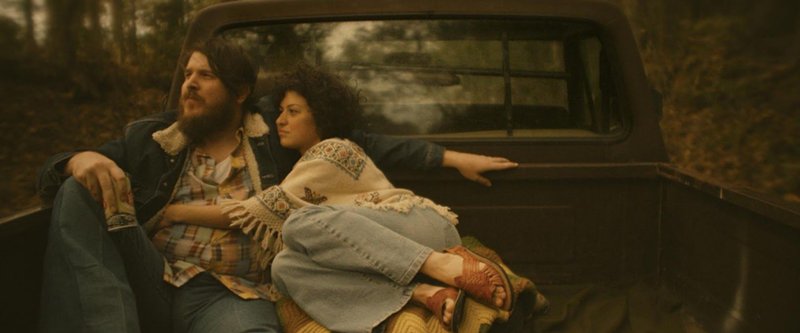The life of Country musician Blaze Foley is explored in the new Ethan Hawke-directed biopic Blaze. Everything about Foley — portrayed by Ben Dickey — was oversized and unwieldy, yet unnervingly engaging. He was a bear of a man, yet watching him cradle and pick away at a guitar made the calming focus music had over him become apparent.
Adapted from the novel Living in the Woods in a Tree: Remembering Blaze by Sybil Rosen, the film feels equally untamed and unruly. In quiet moments with Sybil Rosen (Alia Shawkat), an aspiring actress who became Foley’s muse and wife, a gentleness and empathy is seen that stands in sharp contrast to his otherwise looming presence.
Told as a series of fragmented memories and relayed anecdotes, the viewing experience constantly questions the idea of truth, but not in the way that we’ve been conditioned to by the current social and political environment. This situation is more of an elemental, even mythic desire to capture the essence of our shared encounters with others. The film asks us to consider who we are and how others perceive us.
Foley has a world of feeling barely contained within his big body or mind, which is aflame with love, longing and a need for self-expression. He doesn’t have much — in terms of material needs or belongings — and he wants for even less. He only longs to share his musical gift with the world and be understood.
Part of the narrative framing illustrates just how important this recognition is to him. Hawke captures Foley in a bar, which turns out to be his final performance, where he’s recording a session. Along with members of his regular band, they wait on stage for the arrival of his musical running buddy and fellow rabble-rouser Townes Van Zandt (Charlie Sexton). Foley sets up to play, after promising the bar owner that he will be on his best behavior, which means no heavy drinking or bar fights.
And for the most part, Foley keeps his word; when he leans into the opportunity, he searches his soul for answers to questions the only way he knows how: his music. Before each song, Foley attempts to provide some context for the performance, and then guides both viewers and himself through why it matters. But once he opens his mouth and lets his voice match up with the sad, bent notes, the bluesy heartbreak or the simple romantic desires, all of the pre-ambling melts away, and the film transitions as well. It grants us access to his perspective on key moments from his past, primarily those with Sybil. We see sketches of their tumultuous affair and the painful scars it left on Foley’s psyche.
The inevitability of this performance being his last is never kept from the audience, because we get a second framing device — an on-air interview with Van Zandt with one of his most earnest bandmates and drinking buddies (Josh Hamilton), conducted by a radio personality (Hawke) whose lack of familiarity with Foley’s story allows Van Zandt to create a narrative that takes on a life of its own. We’re left to wonder how much time Van Zandt spent with Foley and whether or not he’s the best person to be telling the tale.
It’s difficult to watch Blaze and not want to compare it to Bradley Cooper’s upcoming remake of A Star Is Born. Hawke and Cooper both take us on a journey that’s not merely behind the music, but inside the beats. In some ways, the big-hearted Blaze serves as a raw merger of the two figures in A Star Is Born — the wizened rocker (Cooper) in the twilight of his career and the young starlet (Lady Gaga) who gets discovered and streaks off into the heavens.
Foley tells us early on that he has no interest in being a star, because they shine brightly and burn out. He wants to be a legend and live on forever. That may be true, but Hawke’s film shines anyway, like a big beautiful crazy diamond in the sky. Grade: A.


